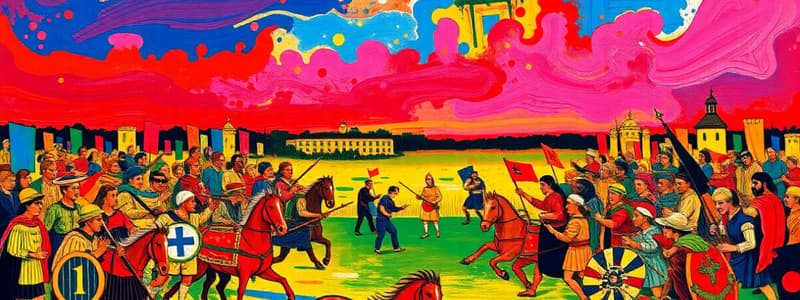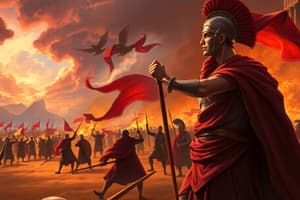Podcast
Questions and Answers
What is Brutus instructing Messala to do?
What is Brutus instructing Messala to do?
- Deliver messages to the legions (correct)
- Assess the enemy's strength
- Join Octavius in battle
- Prepare for a retreat
What does Brutus perceive in Octavius' wing?
What does Brutus perceive in Octavius' wing?
- A strong attack plan
- A strategic alliance forming
- A delay in their movements
- A lack of fighting spirit (correct)
What action does Brutus suggest in response to his observations?
What action does Brutus suggest in response to his observations?
- Launch an immediate attack (correct)
- Survey the battlefield
- Discuss strategies with Messala
- Wait for reinforcements
What does the term 'alarum' indicate in this context?
What does the term 'alarum' indicate in this context?
How does Brutus feel about the situation on the battlefield?
How does Brutus feel about the situation on the battlefield?
What do Brutus's actions suggest about his leadership style during the battle?
What do Brutus's actions suggest about his leadership style during the battle?
How does Brutus's perception of Octavius's wing influence his tactical decisions?
How does Brutus's perception of Octavius's wing influence his tactical decisions?
What can be inferred about the morale of Brutus's troops based on his instructions?
What can be inferred about the morale of Brutus's troops based on his instructions?
In the context of this scene, what role does urgency play in Brutus’s character?
In the context of this scene, what role does urgency play in Brutus’s character?
What does the repetition of the word 'ride' signify in Brutus's dialogue?
What does the repetition of the word 'ride' signify in Brutus's dialogue?
Flashcards
Brutus's instruction to Messala
Brutus's instruction to Messala
To deliver urgent messages to the legions (military units).
Brutus's assessment of Octavius's wing
Brutus's assessment of Octavius's wing
Brutus believes Octavius's troops lack fighting spirit (low morale).
Brutus's suggested response
Brutus's suggested response
A swift, immediate attack to capitalize on the perceived weakness.
Meaning of 'alarum'
Meaning of 'alarum'
Signup and view all the flashcards
Brutus's feelings
Brutus's feelings
Signup and view all the flashcards
Brutus's leadership style
Brutus's leadership style
Signup and view all the flashcards
Tactical impact of perception
Tactical impact of perception
Signup and view all the flashcards
Troops' morale inference
Troops' morale inference
Signup and view all the flashcards
Urgency's role in Brutus's character
Urgency's role in Brutus's character
Signup and view all the flashcards
Repetition of 'ride'
Repetition of 'ride'
Signup and view all the flashcards
Study Notes
The Field of Battle
- The scene opens with Brutus and Messala on the field of battle.
- An alarm sounds, indicating fierce fighting, and Brutus instructs Messala to deliver an urgent message to the legions on the other side of the battle.
- Brutus believes Octavius’s troops are hesitant.
- Brutus urges a swift attack to take advantage of the enemy’s hesitation.
Act V, Scene 2: Battle Lines Blur
- The scene opens with the sound of battle, setting the stage for the final clash.
- Brutus, a key figure in the conspiracy against Caesar, takes charge, issuing orders to his troops.
- He urges Messala to ride to the other side of the battlefield and deliver crucial information, likely concerning the battle plan or strategy.
- Brutus perceives a lack of enthusiasm from Octavius' forces, highlighting a potential weakness.
- Recognizing this, Brutus urges a swift attack to exploit the advantage, emphasizing the importance of decisive action during the battle.
Studying That Suits You
Use AI to generate personalized quizzes and flashcards to suit your learning preferences.


